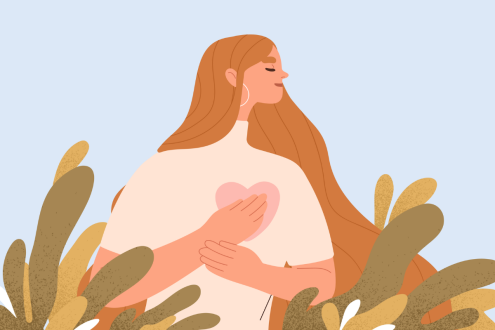Learn to be intimate
Every month, Martha Roberts invites you to road-test research around feeling good

The project: Closeness and intimacy aren’t just fun – they are essential human needs.
The aim: Allowing more intimacy into your life can help boost levels of happiness.
The theory:
When we think of ‘intimacy’, most of us probably think about sex. But we can have sex without intimacy, and intimacy without sex. Intimacy can be present in all close relationships, whether with partners, parents, children or friends, and increased connectedness can lead to greater happiness.
The need for intimacy is primal. Studies show that infants not only like physical and emotional closeness, but fail to thrive without it, while the absence of intimacy in sexual relations can lead to unhappiness and even depression. In The Psychology of Intimacy, Karen Prager says, ‘Intimate relationships seem to buffer people from the pathogenic effects of stress.’ She adds that during stressful life events, people with intimate relationships have fewer stress-related symptoms.
But what is intimacy? A 1992 study defines closeness as, ‘including other in the self’, while in a 1997 study by the same authors, psychologist Arthur Aron says, ‘This feeling of interconnectedness is similar to what some researchers call intimacy.’ A 1988 study found that intimacy is a process in which each person feels that their innermost self is validated, understood and cared for by the other.
Intimacy also pertains to families and friendships, and experts suggest that it is intimacy that gets us through tough times and is the glue that bonds families together.
Now try it out:
- Get interested in others. ‘You can make more friends in two months by becoming interested in other people than you can in two years by trying to get other people interested in you,’ says author Dale Carnegie. Learn to ask about other people and you’ll feel closer to them.
- Ask 36 questions. Psychologists Arthur and Elaine Aron found that couples who develop intimacy are more likely to enjoy enduring, happy relationships. Use their 36 questions to foster and fast-track intimacy. Find the test at 36questionsinlove.com.
- Show empathy. Being empathetic increases intimacy. If a friend is cross with you, acknowledge that she’s upset rather than be defensive, and you’ll allow her to process her feelings and so increase intimacy.
- Have fun. Whether it’s a relationship with a partner, friend or child, a key to building intimacy is to have fun joint experiences. Try finding ‘animals’ in the clouds or telling each other your favourite jokes.
Photograph: iStock








